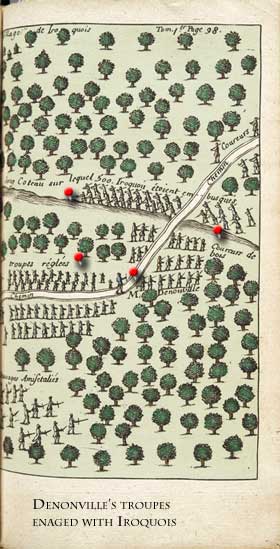Beaver Wars.
The Compagnies franches mission was to protect the lucrative fur trade. The high demand for beaver pelts in the old world had begun to take a toll on the availability of the animals in the new world causing those who profited, Native American and European alike, to expand their territory to keep up with the demand. The belligerents included the British, Dutch and Iroquois (whose lands were deeply affected by the decline) on the one hand, and the French with multiple nations including the Huron, Ojibwa and Illinois Confederation on the other.

The problem first manifested itself in the 1640's. By the mid-1660's France had sent the Carignan-Salières Regiment to shore up the colony. The French alliance with tribes that were traditional enemies of the Iroquois had only fanned the flames. To the misfortune of the French the Iroquois were very successful in expanding their lands.
Robert Cavelier, Sieur de La Salle (1643-1687) brokered a peace with the Illinois and Miami in 1681. This was the same year France began to allow the sale of firearms to the tribes which the meant that their ally, the Algonquins, were finally equipped with the same arms as their enemies who were supplied guns by the Dutch and the English.
With the arrival of the Compagnies franches from France, a series of punitive actions were taken against the Iroquois, and by proxy, the British settlements. There were two incidents that had serious repercussions. Acting on orders from the Ministre de la Marine, fifty sachems, or chiefs, of the Iroquois were lured into a trap by Denonville. Though they came under a flag of truce they were captured and forced into service as galley slaves in 1687. And in September of that year the troops moved down the Richelieu River burning the homes and food stores of the Mohawk, leaving many to die of starvation over the winter.
In 1688 Clément earned a field promotion to enseigne réformé (sublieutenant on half pay). This was a result of his likely participation that year in a foray planned by Denonville into Détroit to harass the Onondagas, who traded furs with the English.
- Dictionary of Canadian Biography, BRISAY DE DENONVILLE, JACQUES-RENÉ DE, Marquis de DENONVILLE
- Image at Canada Arvhives, rare books
